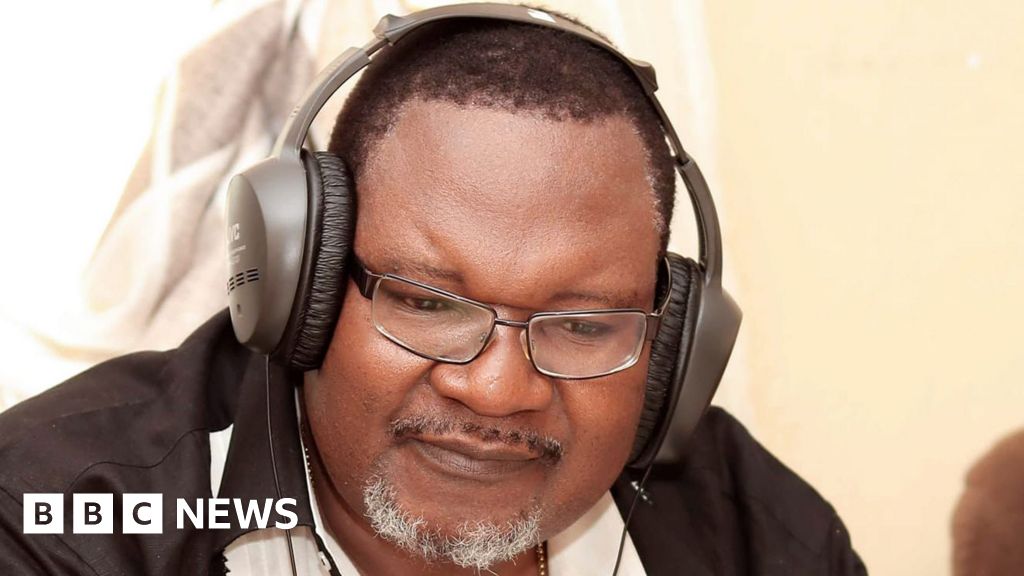The Malawi music icon who became a 'soldier for the poor' - 5 minutes read

As a child, Lucius Chiccio Banda had little interest in music - he spent his days playing football instead.
But Banda's older brother coaxed him to join a church band, setting him on a path to become a Malawian musical legend, political activist and "soldier" for the poor.
Banda, who died in South Africa on Sunday night after battling a kidney-related illness for close to five years, enjoyed huge popularity across Malawi.
Tributes for the 53-year-old have poured in from all sectors of Malawi society. Following his death he has been honoured by artists, politicians, religious leaders and prominent sportspeople.
President Lazarus Chakwera said: “It is with deep sorrow that the First Lady and I mourn the passing of Hon Lucius Banda, who was the Presidential Advisor on Youth and Arts.
"His political activism through music that captured our hopes and dreams, especially during the fight for democracy has profoundly shaped our nation, giving voice to the voiceless and challenging injustices."
Banda hailed from the Malawian town of Balaka, located around 200 km (124 miles) south-east of the capital, Lilongwe.
The most notable feature of this town is a huge, influential Catholic church, one of the biggest in the whole of Southern Africa.
Banda's mother, Maria Jeremiah, was just 14 when she got married. She got divorced in her mid-twenties after having seven children, two of whom died.
In interviews Banda often spoke about how he did not have any recollection of his father as he was very young when his parents got divorced.
His mother raised the children alone and the family lived in dire poverty. Banda walked to school barefoot, wore torn clothes and slept in a leaky, grass-thatched hut.
“I first had a pair of shoes at the age of 16,” Banda once said. When he travelled to the town centre, he would carry his shoes in a plastic bag and only put them on once he had almost arrived.
“I did not know when next I was going to have another pair of shoes, so I need to take care them so that I could have them for a long time,” he explained.
Banda's elder brother, Paul, was a leader of a church group called Alleluya Band. He persuaded Banda to abandon football for music and taught his seven-year-old brother how to play the keyboard.
By the age of 13 Banda joined Alleluya Band and two years later he was on stage for the first time, performing at a wedding.
For the church, Alleluya Band was a way of keeping young boys busy and out of trouble. For Banda, it helped him fall in love with music and pushed his musical talents to the fore.
In the early 1990s, when Malawi was transitioning from single-party authoritarian rule to a multi-party democracy, Banda decided to quit Alleluya and go solo.
He found singing in the band limiting, as practically all its songs were about religion.
He wanted to make music that held powerful messages about freedom and the fight against social injustice.
As a solo artist, he recorded his first album titled Son of a Poor Man in 1993. It became an instant hit.
One of the most popular songs on the album was Mabala, which means "wounds" in the Chichewa language.
Mabala criticised the poor human rights record of the president at the time, Hastings Banda (no relation) - a risky move. However, the musician didn't receive much blowback from the authorities, possibly because by that point the president was under pressure from all sides and was months away from being voted out.
Banda went on to release several more albums, becoming one of the biggest musicians in the country. In Malawi, he is best known by the moniker “soldier” after he called himself “a soldier for the poor”.
He also became an ally of President Bakili Muluzi, who deafeated Hastings Banda in the country's historic 1994 elections. The "soldier" sang political songs praising Mr Muluzi's leadership and his political party, the UDF.
In 2010, after Mr Muluzi left power, the state-owned Malawi Broadcasting Corporation (MBC) banned some of Banda’s music on its two radio stations.
It is thought the music, which criticised the administration of then-president Bingu wa Mutharika, was prohibited for political reasons.
But the ban only increased the musician’s fame and sales of his records soared.
Beyond music, Banda served as a MP for the UDF between 2004 and 2006 and 2014 and 2019.
His first stint in parliament did not end in glory. He was arrested and later convicted for faking his academic credentials. At the time, Banda told the BBC the government was "punishing" him for putting forward a motion proposing procedures to impeach the president.
He lost his parliamentary seat after a Magistrate’s Court found him guilty and sentenced him to 21 months in prison.
The episode damaged his political career but did very little to dampen his musical one. He continued to compose and play music, putting on shows that drew huge crowds.
In 2018, he was awarded a Lifetime Achievement accolade by a local music charity, the Urban Music People (UMP).
UMP called Banda “the epitome of music in Malawi and probably the biggest musical act Malawi has ever produced”.
Banda returned to politics in 2014, and managed to reclaim his parliamentary seat.
In 2019 he lost the seat again. He joined the opposition UTM Party, headed by the late Vice-President Saulos Chilima, who died in a plane crash last month.
He failed to become an MP again while with the UTM, but with his party going into government as coalition partners with President Chakwera’s Malawi Congress Party (MCP), Banda was given a position of advisor to the president on youth and arts, a position he held until his death.
Banda is survived by his wife, Sunganani and three children.
Source: BBC News
Powered by NewsAPI.org